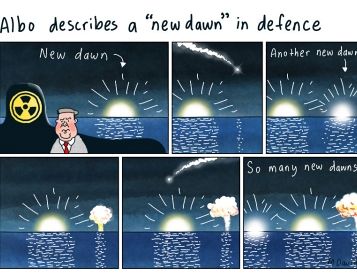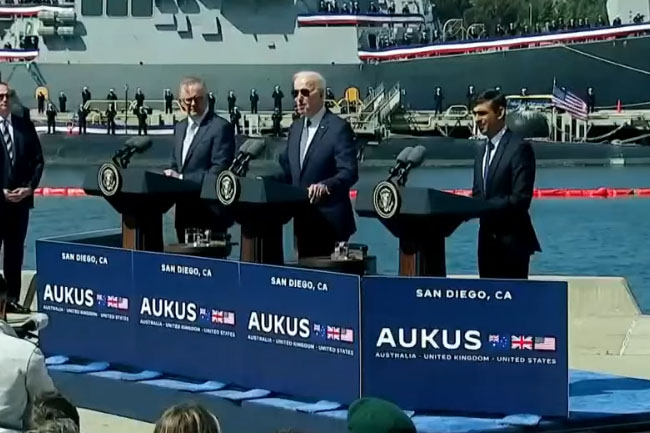The AUKUS deal and Australia's commitment to costly submarines have raised concerns that our foreign policy is being led by the military, writes Professor Adil Khan.
ON 14 MARCH, Prime Minister Anthony Albanese stood side by side the British Prime Minister Rishi Sunak and U.S. President Joe Biden at a Naval base in San Diego, USA and signed off the next phase of the AUKUS deal — a purchase by Australia of three nuclear-powered submarines, jointly manufactured by the UK and the U.S.
In an Australian Government press release, the three leaders affirmed that the ‘trilaterally-developed submarine based on the United Kingdom’s next-generation design that incorporates technology from all three nations, including cutting edge U.S. submarine technologies... a new security partnership [between Australia, UK and USA] that will promote a free and open Indo-Pacific that is secure and stable.’
Following the above announcement, Australia’s former Labor Prime Minister, Mr Paul Keating, strongly criticised the deal at a press briefing held on 15 March at the National Press Club in Canberra, where he lambasted the deal claiming that the deal would do more harm than good to Australia.
One of Australia’s leading media outlets, SBS News, has termed Keating’s criticisms of AUKUS, as ‘astonishing’.
The Prince of Denmark
True, Mr Keating’s response to AUKUS, a deal which has been endorsed by the Labor Party (ALP) Government and a deal which was inked by its predecessor, Liberal-National Party (the L-NP), Labor’s supposed ideological rival has indeed been scathing, but by no means “astonishing”.
A deal of this nature, which has significant security and economic ramifications for Australia, should have been discussed in detail, both within and outside Parliament before it was inked. But was not.
By dissecting the deal in terms of its security and economic implications – and by the way, in a globalised economic system, security and economic dimensions are interlinked – and by exposing the deal’s pros and cons for Australia (mostly cons), Mr Keating may have done the Prince of Denmark — “be cruel to be kind”.
“Anglosphere” affinities
Australia, a country that is in an ethnically varied and demographically daunting neighbourhood and a region from which it derives most of its economic benefits, needs to carefully weigh its foreign and security policies in a manner that responds more pragmatically and sensitively to the changing geoeconomics and geopolitics of the world.
The world is on the move, where the old unipolar order is fracturing and giving way to a new multipolar world.
Mr Keating, a man of exceptional vision, is among few in Australia who clearly saw these changes decades ago and acted accordingly to bring Australia closer to the region and not move away from it and in the process, resuscitated Australia’s stagnating economy and bolstered its bond with the neighbours.
Thus, Keating is fully aware of the danger the AUKUS deal poses to Australia, a deal which according to him fulfils the agenda of the “old colonial masters” and not Australia’s, and a deal which is likely to be viewed by Australia’s neighbours, especially by China, a key trading partner, as ‘an arms race in the Indo-Pacific, with a Cold War mentality’ and a return ‘to our former colonial master, Britain’.
Albanese, however, defends AUKUS by saying that the initiative is “a really exciting opportunity for Australia” which does not pose threats to anyone let alone China and assures that AUKUS is a deterrent against future threats and not for attacking anyone.
Mr Keating has trashed the Labor Government’s justification for the submarines as “rubbish” and warned of the dangers of installing a military facility in Australia that has the potential to intimidate, the “mighty” China, the unannounced but very real target of the submarines.
Indeed, it is conceivable that many in the Asia/Pacific region are likely to regard AUKUS, which seeks ‘security in and within the Anglosphere’, as a revival of a hegemonic nexus that once colonised, waged wars, devasted and traumatised their countries. After all, it was not that long ago that Australia partnered with the U.S. in wars in Vietnam, Korea, Iraq, Syria and Afghanistan — all illegal and immoral wars and all contributed to the massacre of thousands of innocent people and destroyed their countries.
“Mighty” China
If indeed, China is the target of AUKUS and all evidence suggests that it is, it would do us some good to appreciate that China is no longer impoverished and poor. Nor is it – as we see in our China Towns – a great place to have cheap noodle soup, served by petit and polite waitresses.
China has progressed vastly – economically, technologically and militarily – and reportedly, has outpaced the West in certain aspects, including in military arsenals. Reportedly, China regards AUKUS as a ‘path of error and danger’.
Gazing at the mirror
Several decades ago during the Keating era, especially at a time when Mr Keating was aggressively promoting the idea that Australia is a part of Asia, mainly to benefit from Asia’s rising wealth, he apparently drew a map of Asia where he showed Australia as part of Asia.
Around this time, an Australian journalist who was based in Kuala Lumpur showed the map to Dr Mahathir Mohamad, then the Prime Minister of Malaysia, who rejected Australia’s claim to its Asian-ness, to convince him that despite his contrary thoughts, Australia sees itself as part of Asia.
However, Mr Mohamad, who never missed an opportunity to insult Australia, would have none of it and retorted: “To find out whether you Australians are Asians or not, do not look at the map, look at the mirror.”
Such antagonisms from some of the Asian leaders who refused to accept Australia as part of Asia did not deter Mr Keating's persistence and with success, the result of his mission to integrate Australia with Asia was that all parties gained, especially Australia.
AUKUS would most certainly fracture the equilibrium of mutual benefit between Asia, more importantly between China and Australia. Sadly, the current political bunch, both L-NP and Labor, don’t seem to see the picture. They seem to be making policies by gazing at the mirror and not at the map, the economic and geopolitical realities of the time.
Run by the military
Mr Keating also suspects that Australia’s sudden shift towards “Anglospheric” hegemonic security policy may have something to do with the fact that these days, Australia’s foreign policy is “run by the military” and not by the foreign office. If true, this is ominous.
A story from the Indian subcontinent may explain better the harm the control of national policies, foreign or otherwise, by the military causes to a nation.
In 1974, Pakistani-British political activist Tariq Ali conducted an interview with Mrs Indira Gandhi, the then Prime Minister of India, at her office in New Delhi.
The interview was held in the aftermath of the Pakistan Army’s 1971 defeat at the hands of the Indian Army and the Bangladesh liberation forces that led to the dismemberment of Pakistan and the emergence of its erstwhile eastern wing into Bangladesh as an independent state.
While reflecting on the arrogant and myopic policies of the Pakistan Army – which at the time ran the country, contributed to a civil conflict and led to the break-up of Pakistan – Tariq Ali told Mrs Gandhi: “Pakistan’s problem is that our generals are stupid.”
To this, Mrs Gandhi replied by saying:
Mr Ali, how about I share one of my own experiences of an encounter with one of our generals? You see, in 1971 when the Pakistan Army surrendered and East Pakistan was gone, our Chief of Army Staff, General Sam Manekshaw came up to me and said, ‘Madam Prime Minister, East Pakistan is gone and we are also deeply inside in several parts of West Pakistan. If you order, we can march into Islamabad, Pakistan’s capital city in 24 hours and take over the rest of Pakistan’.
After listening to General Manekshaw’s ambitious idea, Mrs Gandhi told the General: “General, why don’t you give me 24 hours to make the decision.”
Mrs Gandhi then called an emergency cabinet meeting and informed her cabinet colleagues of the General’s idea. The Cabinet was unanimous in its response — “absolutely not”.
Mrs Gandhi turned to Tariq Ali and said:
“You see when it comes to stupidity, our generals and your generals are not different, they are all stupid. The only difference is that, unlike Pakistan, generals in India do not make policies.”
If Mr Keating’s suspicion is correct that Australia’s military has taken over the running of Australia’s foreign policy and in the process, weaponising diplomacy, then it indeed is deeply concerning.
“Dig two graves” — Confucius
Finally, since AUKUS is aimed at China (regardless of official denials, let us not kid ourselves — the target of submarines is China), it may also not be a bad idea to take a lesson or two from China to prepare against repercussions.
Confucius, one of China’s wisest men once is attributed as having said: “Seek revenge and you should dig two graves, one for yourself.”
Since China never considered Australia as an enemy and thus has no plan to attack, China has no need to dig a grave for itself.Given that Australia has made China the target of AUKUS submarines, the submarines would cost Australian taxpayers $368 billion upfront to procure and billions annually to maintain, including the costs and hazards of storage of fuel wastes.
Furthermore, the deal would most certainly wreck the decades-long vital trade and investment ties between the two countries which most certainly would hurt Australia more than China. It is obvious that Mr Albanese has already commenced digging Australia’s grave.
Professor Adil Khan is an adjunct professor at the School of Social Sciences, University of Queensland and a former senior policy manager of the United Nations. Adil is also a member of the Rohingya Support Group, Queensland.
Related Articles
- Australia’s submarine deal is a disaster and we know who to blame
- CARTOONS: Mark David goes nuclear with the defence budget!
- Australian economy first casualty of AUKUS pact
- Stopping Australia's path to America's war
- Albanese Government's secrecy over nuclear weapons grossly irresponsible
 This work is licensed under a Creative Commons Attribution-NonCommercial-NoDerivs 3.0 Australia License
This work is licensed under a Creative Commons Attribution-NonCommercial-NoDerivs 3.0 Australia License
Support independent journalism Subscribe to IA.
















